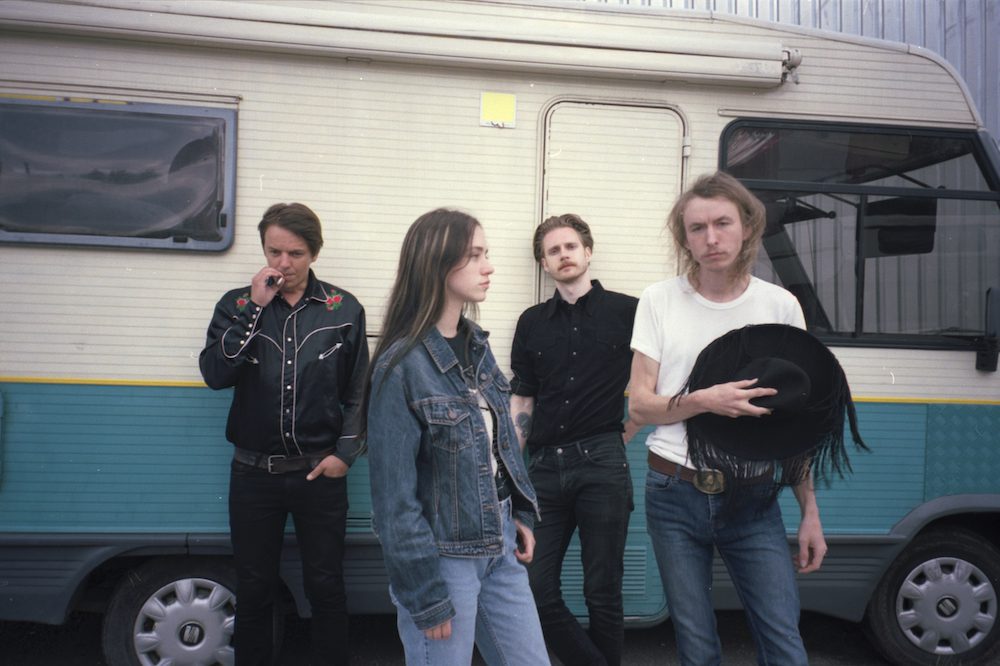

Guitarist Lauri Raus and vocalist Eliann Tulve, the main members of Holy Motors, are from Estonia — but their music is infused with Americana roots, and they draw inspiration from movies about the Wild West.
They often get asked about how being Estonian influences their music, or how their country’s music compares to the United States’. But for them, songwriting is more about playing on cultural tropes and motifs than representing any real place. Accordingly, the band describes itself on Bandcamp as “a Tallinn, Estonia based dark twang & reverb band from a nonexistent movie,” elaborating, “it bows to engines and echoes and film-directors.”
“Estonia is mostly connected to peasantry and noblemen, and the states are [considered] more free-roaming, and that’s up our alley,” says Raus. “I wouldn’t want to write a song about a landlord putting peasants to work — it’s more fun to write about a cowboy. But we make it up in our heads; it’s mostly what we see in the movies. It has nothing to do with what the country is about.”
Their latest album, Horse, co-written by Raus and Tulve (with two songs, “Midnight Cowboy” and Trouble,” co-written by Hendrik Tammjärv), is based on a combination of these fictional stories than have captured their imaginations and their own life experiences. Incorporating indie rock and country elements with hints of shoegaze, it’s a collection of vignettes about loneliness and life on the road, with Tulve’s deep, meditative vocals taking the listener on a journey around the world from the beginning to the end.
The LP, released October 16 via Wharf Cat Records, opens with the catchy breakup song “Country Church,” then segues into “Endless Night,” which was based on the band’s experiences while touring in France, when a window in their hotel room was smashed. In the song, they imagine that thieves have broken in and stolen jewelry, a metaphor for the fears that haunt our minds. “There’s haunting throughout the album,” Tulve explains.
The next track, “Midnight Cowboy,” a ballad reminiscent of ’50s love songs, was also based on touring experiences; Tulve wrote it about wandering through Spain at night. “I kind of felt like the guy from the movie Midnight Cowboy, and I was imaging him,” she says. “I remember also just being kind of torn about something and just longing for someone.” She also had another pop culture trope — a girl in an ’80s movie waiting by the phone —in her head when she wrote it. “It’s kind of like being sad while everyone else around you is having the time of their life, like at an American-style high school prom,” Raus agrees.
In “Road Stars,” a slow, folky, acoustic duet in the vein of Edward Sharpe and the Magnetic Zeros, Raus and Tulve imagine a conversation between a truck driver and a woman at a gas station, alternating between melancholy verses like “I’m as lonely as man in the makin’ of land” and the comforting refrain: “I know one day I’ll be better than before.”
“Matador” continues the theme of solitude, sung in a low, flat, almost monotone voice that conjures up ’90s grunge rock against psychedelic electric guitars. To close the album, “Come On, Slowly” paints the picture of an empty but idyllic town, “Trouble” sounds like something playing in an old Western movie scene as the villain approaches, and “Life Valley” is a jam they improvised in Leo’s Basement #2, the Berlin studio where they recorded the album.
Since they had to fly to Berlin with minimal luggage, they each just brought a guitar then took advantage of additional guitars in the studio, along with a drum set and percussion toys. Producer Craig Dyer accompanied them on synths, bass guitar, and vocals, and producer/mixer Leonard Kaage played organ, synths, piano, and bass guitar.
Raus and Tulve began playing music together in 2013 just for fun then evolved into a band, releasing their first full-length album Slow Sundown in 2018. “The first album was basically a collection of songs we wrote over five years — maybe it was even too eclectic for me, but it was still fun,” says Raus. “And then this album felt really different. Just a couple years passed, and things changed. I was happier with this one; it was more smooth creatively.”
The band is about to play their first live show since quarantine in their native country, then hopes to return to the studio to record more music next year. In the meantime, the current state of the world should give them plenty of inspiration for more lonely cowboy anthems.
Follow Holy Motors on Facebook for ongoing updates.

